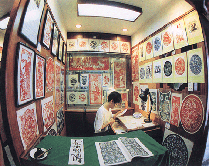|
Project to Rescue National Intangible Cultural Heritage
|
| |
 China -- a cradle of the world's intangible cultural heritage -- has launched a project to authenticate, rescue, preserve and study the nation's oral and intangible heritage.
China -- a cradle of the world's intangible cultural heritage -- has launched a project to authenticate, rescue, preserve and study the nation's oral and intangible heritage.
The country will also undertake a survey of the treasures in the next five years throughout China, Pan Zhenzhou, vice-minister of culture, said yesterday during the opening of a three-day international symposium on safeguarding and preserving oral and intangible heritage.
Intangible heritage is defined by the United Nations Educational, Scientific and Cultural Organization (UNESCO) as "the totality of tradition-based creations of a cultural community, expressed by a group of individuals and recognized as reflecting the expectations of a community."
Besides the Chinese Kunqu opera, which was listed as one of UNESCO's 19 masterpieces of oral and intangible cultural heritage in 2001, the ancient Chinese zither, paper-cuts, the world's longest epic poem of Tibetan King Gesser, Sichuan opera and Yunjin brocade from Nanjing, are also examples of the cultural gems of China.
"This heritage serves as a source of deep national pride and a valuable contribution to the shared cultural legacy of mankind," said Yasuyuki Aoshima, director and representative of the UNESCO's Northeast Asia office.
He acclaimed China's efforts, especially the Chinese Academy of Arts, in preserving oral and intangible heritage.
At yesterday's meeting, culture and history experts from home and abroad exchanged experience in heritage protection and discussed the relationship between protection and creation.
Tang Yijie, a renowned philosopher at Peking University, encouraged innovation rather than merely keeping heritage intact for the better protection of ancient intangible treasures.
He hailed the efforts of famous Chinese composer Ye Xiaogang, who attempted to play a Kunqu opera with a symphony orchestra.
Jin Zhilin, a professor at the Central Institute of Fine Arts, said the salvage and preservation of intangible heritage should also focus on the people, not merely official records or collections in museums.
He said the preservation of tangible heritage is material, while the inheritance of intangible culture is human. To inherit and develop intangible heritage is the best way to preserve ancient cultural gems.
"It is important for any culture to encourage new development in which one can feel the appreciation of the past, but does not try to recreate the past as if we were still living in that past," Jin said.
(China Daily December 9, 2002)
|
|
|

